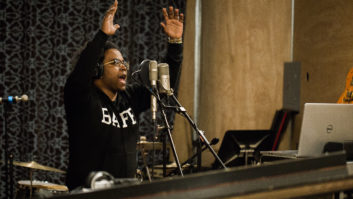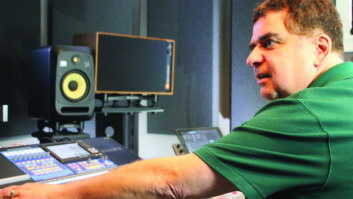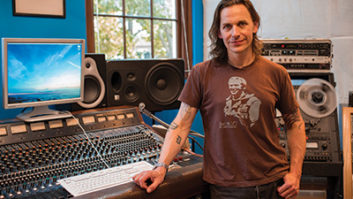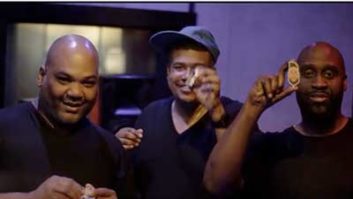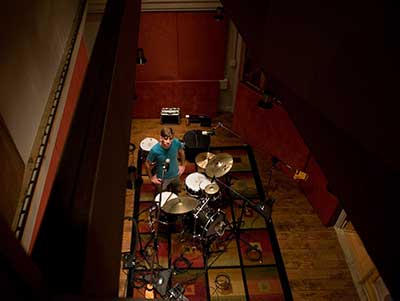
Legendary songwriter/vocalist/musician Rickie Lee Jones headed to New Orleans to work on her latest album, The Other Side of Desire, at Music Shed Studios. This is the first release of new songs in a decade for the two-time Grammy Award-winning artist.
Producer John Porter says they tracked everything live except for one song, “Haunted,” where he kept the original demo and then overdubbed on it. They also settled on using an AKG C414 mic for Jones, and a Shure Beta 87 on the upright bass. Porter says he wrapped the mic in foam and then stuffed it under the bridge so the bass player didn’t have to maintain a constant position relative to the mic.
Porter ended up having to do a bit of editing on this particular project. “RLJ wanted to change the keys of two or three songs—in some cases, quite considerably—and also wanted to change the tempo of a couple of those—one faster and one slower—after they’d been recorded and we no longer had the musicians around,” Porter says. “I was able to do it using assorted bits of technology: Beat Detective, Elastic Time, Pitch ‘n Time, et cetera, and also by then replacing acoustic guitars and vocals. I then mixed it at my home studio in England at Independence Street West.”
Engineer Michael Dorsey says they used an assortment of microphones to track the drums, each of which captured a certain aspect of the sound that, when summed together, creates a larger sound than a single mic could. “This process took more time to dial in each mic, as well as making sure the electrical and acoustical phase was correct,” Dorsey says. “I also tracked the drums with little to no EQ, as well as not compressing while going to the converters.”
For the horns, Dorsey used a combination of an RCA 77-DX, a Royer R-121, and Cascade Fathead II ribbon mics. All Ribbons ran through the Grace Design m802 preamps. “For me, capturing brass instruments with ribbons is essential,” Dorsey says. “Ribbons provide such a natural and pleasing listening experience. Coupling these ribbons with Grace preamps provides the articulation and clarity that we have come to expect. This combination really makes the listener feel like they are in the room with the musician.”
New Orleans jazz-funk-jam group Galactic was also at Music Shed working on Into The Deep, the band’s eighth full-length release. The album, produced by Ben Ellman and Robert Mercurio, features guest appearances from Brushy One String, Macy Gray, JJ Grey, Maggie Koerner, Ryan Montbleau, David Shaw of the Revivalists, Mavis Staples and Charm Taylor.
Engineer Ben Lorio chose a Royer SF-12 for overheads, and an AKG D 112 and a Subkick were used on the bass drum. “On the snare, we used a Telefunken M80 for the top and an AKG 414 on the bottom,” Lorio says. “We went pretty standard on the toms with [Sennheiser] 421s. We used a pair of AKG C12VRs in front of the kit in an ORTF pattern, and a pair of Coles 4038s went into miking drummer Stanton Moore’s percussion world. We also used a Shure SM57 in the center of the kit, heavily compressed with a UA Bluestripe 1176 for a bit of ‘trash’ as an option.”
Bass went direct through an API preamp, and the amp was miked with a Neumann TLM 103. Electric guitar was an SM57 and a Royer R-121 through Chandler Limited TG2 preamps. The Wurlitzer went direct through an API preamp, and also a Vox AC30, which was miked with a beyerdynamic M88 to “give it a little crunch,” Lorio says. Ben Ellmen’s baritone sax was miked with an RCA 77-DX. Lorio used the Coles 4038 on Corey Henry’s trombone because “I like how it rounds off the edges on brass instruments.”
American Idol season 14 finalist and Postmodern Jukebox artist Joey Cook worked on new material with Music Shed engineer Adam Keil, who engineered and produced (with others) the project. “Joey’s session turned out to be very interesting because there ended up being many producers,” Keil says. “Since Joey is still exploring different sounds with a full band, she decided to give the album a variety-show type of theme, letting certain musicians who played a big role on a song take over the production.”

Cody Bowers from Mammoth Indigo did two songs, Zach and Megan Moats from The Dharma Initiative did two songs, Keil did two songs, and the rest was mostly Cook. “We tried a few different mics for her vocals,” Keil says. “She ended up liking the C12VR the most, but we used an 87 on a couple tracks and the RCA 77 on one track. I used Glyn Johns’ technique for overheads on drums, since she wanted a couple of the songs to have a sort of retro, soul feel to them.”
Keil used the 77 for most of her ukulele tracks. Cook played electric ukulele on a couple songs, as well, through a Fender Bassman 135 amp. “We tracked everything one instrument at a time, starting with Joey setting the form of the song on ukulele or accordion with vocals, and we built everything up from there,” Keil says. “There is a huge range of instruments throughout the album, including pianos, guitars, several vocalists, melodica, organ and all sorts of drums and percussion.”

THE GREYHOUNDS, YOUNG DOLPH AND THE WEEKS AT ARDENT STUDIOS
The Greyhounds, from Austin, Texas, have been working on their second album for the Ardent Music Label in Studios B and C at Ardent Studios in Memphis. The duo tracked material for this album over the past two years at many different studios (at Ardent, at their studio in Austin, in Atlanta—wherever they were on tour), so one of the major challenges was creating a sonically cohesive album, highlighting the oddball sounds and effects the band produces with their recording style, while still putting together solid, album-ready mixes. The Greyhounds and Reed Turchi are producing the material, and Adam Hill is engineering. They used Spectrasonics channel strips (mic line, amp, and 2-band EQ) from the original Ardent console installed at the early National Street Ardent location in the 1960s, now rehoused and refurbished as floating gear. They also used Fairchild compressors (two 660s and one 670), EMT Plate Reverbs and Ardent’s Echo Chambers.

Memphis-based rapper Young Dolph (Paper Route Empire), who has worked with Juicy J (Three 6 Mafia) and 2 Chainz, was at Ardent working on his mixtape Shittin on the Industry, which features production from Mike WiLL Made-It, DJ Squeeky, Cassius Jay, Zaytoven, Izze the Producer, TM88 (of 808 Mafia), and Reazy Renegade. They worked in Studio B with engineer/mixer Ari Morris, who used Neumann mics to capture Dolph’s dynamic vocal performances in the booth.

The Weeks, an indie rock band from Jackson, Miss., are currently at Ardent working on their third studio album with Grammy Award-winning producer Paul Ebersold and engineer Josh St. Moblo in Studio A.
